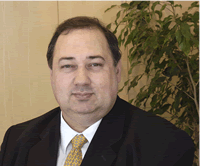Roderick Barnard
Partner
Accenture
Graduated 1981
 In 1981 I took a years leave of absence from my masters in mathematics to make some money. I joined the Management Information Consulting Division of Arthur Andersen (which became Andersen Consulting and is now Accenture). More than 22 years later I am still there. The reasons for this are simple. I like the people I work with, am passionate about the work that I do, and am challenged by the variety of clients I assist. Importantly I am doing something where I make a difference. By chance, on a flight to San Francisco a few years ago, I ended up sitting next to the Marketing General Manager of an old client with whom I had worked previously. In the conversation that ensued he said if we hadn't done the work we did together, his company would not be in business today.
In 1981 I took a years leave of absence from my masters in mathematics to make some money. I joined the Management Information Consulting Division of Arthur Andersen (which became Andersen Consulting and is now Accenture). More than 22 years later I am still there. The reasons for this are simple. I like the people I work with, am passionate about the work that I do, and am challenged by the variety of clients I assist. Importantly I am doing something where I make a difference. By chance, on a flight to San Francisco a few years ago, I ended up sitting next to the Marketing General Manager of an old client with whom I had worked previously. In the conversation that ensued he said if we hadn't done the work we did together, his company would not be in business today.
I am currently a Partner in the Communications and High Technology group within Accenture. In this role I am responsible for creating shareholder value for Accenture through creating value for our clients, developing our people and operating our business. In addition to leading complex technology delivery programs for clients, my current roles include leading the specialist technology unit within this group and business operations for the group. My projects have included: a business strategy for a broadband ISP, implementing the technical infrastructure for a taxation department, developing a network architecture for an international airline, and implementing aircraft maintenance systems for military aircraft. Recently I have been implementing workforce scheduling and service assurance systems for a telecommunications company.
My Honours thesis was on "The Bounded Consistency Theorem". Today I wouldn't know a locally convex Frechet space if one fell on me. Throughout my career I have rarely used the content I learned in my degree. However I use the techniques every day. I solve problems for a living. This requires skills in identifying, defining and analysing problems. It requires the ability to create hypotheses and to test them. These analytical skills are the same as those used in mathematical problem solving.